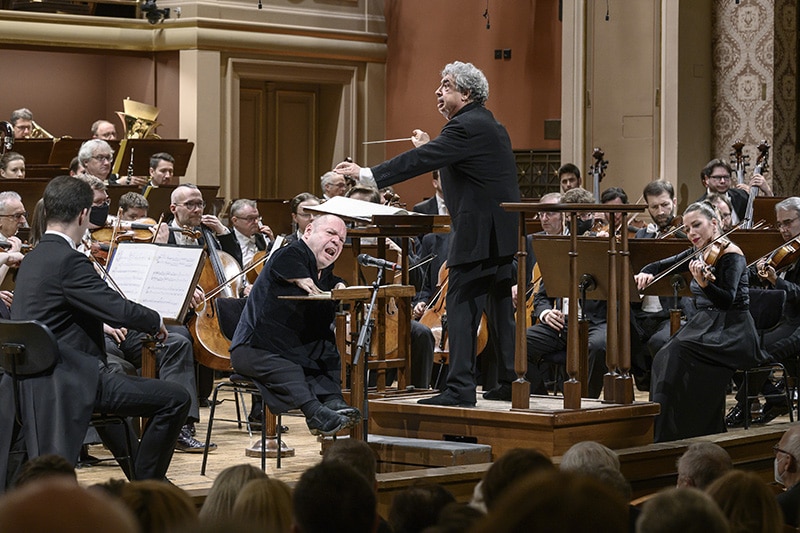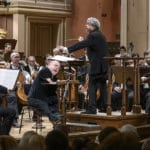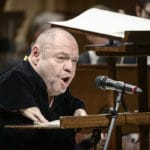Thomas Quasthoff returns with a Theresienstadt set
NewsI sometimes think that concert life has never fully recovered since the great German bass-baritone retired for health reasons ten years ago, in January 2012, when he was just 52.
There have been tantalising sightings of him since then on various stages, as a speaker or presenter, but seldom as a singer.
On Thursday, he made a rare appearance with an orchestra in Prague, performing Rilke’s poem The Love and Death of Cornet Christopher Rilke in a setting by the Theresienstadt concentration camp composer Victor Ullmann. Theree weeks after its first performance in the camp, Ullmann was put on a train with his wife and clild to Auschwitz, where they were murdered on arrival.
Semyon Bychkov conducted the Czech Philharmonic. Review here (in Czech).
Wish we could hear this.
photos
: Petra Hajská








It’s originally for speaker and piano, the last work sketched by Ullmann in Theresienstadt. His orchestration was sketched out but left incomplete.
Thomas Quasthoff did perform at the Edinburgh Festival with his jazz quartet read my review in the Edinburgh Music Review
If it’s not a real long work, it would be real nice if Pentatone were to issue it as a filler on one of their eventual Mahler releases with Bychkov/Czech Philharmonic. Mahler 3, for example, always needs two discs. Given Bychkov’s expansive timings for the 9th symphony, that one will need two discs also. Wouldn’t it be a nice gesture to use the Ullmann as a filler, instead of the ubiquitous 10th Symphony Adagio movement.
Jesus!
Just stop it Thomas Quasthoff.
Its just terrible, i went to your show, nothing works, just very bad taste.
Wonderful!
I don’t know what it is, but the Czech Philharmonic has a genius for presenting really compelling programs. The combination of an orchestra still fairly steeped in the Central European tradition, the small hall on the Vltava, the loyal Prague intelligentsia audience, and thoughtful programs like this just music sound so much better and mean so much more there. This just wouldn’t work the same way in an American concert hall.
During his time as chief conductor of the Czech Philharmonic Orchestra from 1993 – 1996, Gerd Albrecht performed many works by Czech composers with the orchestra that were (largely) unknown to the orchestra itself: Schulhoff, Ullmann, Klein, Krása, Weinberger. He recorded some of these composers with the Czech Philharmonic Orchestra on CD in ORFEO International’s “Musica Redviva” series, a series of works by once banned or unjustly forgotten composers.
Viktor Ullmann’s work “Die Weise von Liebe und Tod des Cornets Christoph Rilke” (incidentally also a work that Albrecht recorded with the Czech Philharmonic Orchestra and performed for the first time in Austria in 1995 at the Vienna Konzerthaus) is for narrator and orchestra, so Thomas Quasthoff presumably did not sing but remained true to his new role as narrator.
The “genius” you mention benefits greatly from Albrecht’s preparatory work. Politically and humanly, Albrecht may not always have acted wisely, but in terms of repertoire, he raised the Czech Philharmonic to a new level.
Kabeláč’s “Mysterium času” is currently also frequently conducted by Jakub Hrůša (he also brought the piece to the Berliner Philharmoniker in 2019) and is somehow used as an example that there is also contemporary Czech music. Whether this work really needs to be given the stage it currently enjoys – I don’t know.
The programme began with another rarity – The Mystery of Time by Miroslav Kabelac ( 1908 – 1979 ) a very underrated Czech composer and finished with Brahms1.
Czech Phil are currently on top form and Bychkov’s concert this week comprises a piece by a contemporary Czech composer, Martin Smolka, the Stravinsky piano concerto with Yuja Wang and the Glagolithic Mass. The beer is good too!
You will be able to hear it in the Vienna Musikverein on March 6: https://www.musikverein.at/konzert/eventid/45524